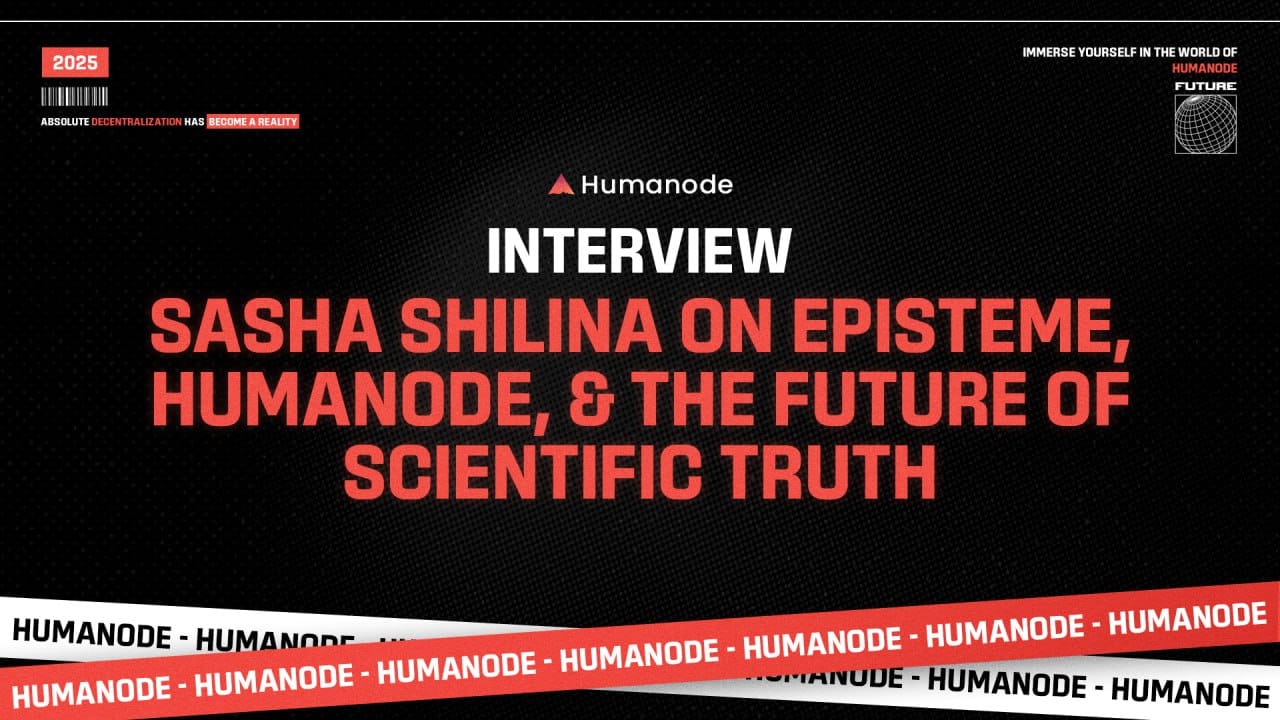🎙️ Interview: Sasha Shilina on Episteme, Humanode, and the Future of Scientific Truth

We spoke with Sasha Shilina, researcher, Humanode founding member, and co-founder of Episteme, about why she believes science needs a new economic model, how Humanode provides the foundation for fairness, and what a marketplace of truth could mean for researchers and citizens alike.
Q1. Sasha, you’ve worked at the intersection of blockchain and science for years. What motivated you to launch Episteme now?
Sasha: I’ve always been fascinated by how infrastructures quietly shape what we believe is possible. In crypto, you can feel it: Bitcoin redefined what money could be, Ethereum redefined what applications could be. But when I looked at science, I saw that the infrastructure was lagging decades behind.
The reproducibility crisis is just a symptom of something deeper: we don’t have good systems for incentivizing truth. We fund novelty, we reward prestige, but we rarely reward validation. Episteme is our attempt to flip that incentive structure. To make validation exciting, profitable, participatory.
Q2. You often say “truth must resist capture.” Can you explain what that means in practice?
Sasha: Capture is when truth bends to power. In blockchains, it’s plutocracy: whoever holds more tokens or hashing power controls outcomes. In science, it’s prestige monopolies: a few journals, universities, or committees deciding what counts as credible.
When truth is captured, discovery narrows, ideas are filtered through bureaucracies instead of tested openly. Episteme is an attempt to design against capture. We are turning hypotheses into markets, anyone can contribute to the process of verification. And by building on Humanode, we ensure that contributions can’t be drowned out by bots or whales.
Q3. Why Humanode specifically?
Sasha: Humanode has always been radical. The idea that identity is a commons, not a commodity completely changed my thinking. Most systems treat identity as something to sell or exploit. Humanode treats it as a shared resource, something that protects fairness instead of undermining it. That philosophy aligns perfectly with what we’re trying to do in science. If Episteme is to be a marketplace of truth, it needs to stand on a foundation where each human counts equally. Humanode’s design gives us exactly that, not just a technical foundation and infrastructure, but also a kind of moral one.
Q4. You’ve coined the term DeScAI. How does that reshape how we think about research?
Sasha: DeScAI is the convergence of decentralized science and artificial intelligence. On the one hand, you have DeSci, new tools for funding, publishing, and governing research. On the other hand, AI has become indispensable for scanning data, finding patterns, and even designing experiments. The two need each other. DeSci without AI is slow, AI without decentralization risks being captured by a handful of corporations. Together, they can create what I like to call epistemic recursion, systems that can continuously generate, test, and refine knowledge without waiting for a gatekeeper’s approval.
Q5. What role do you see for citizens, people outside academia, in Episteme?
Sasha: Honestly, that’s the most exciting part for me. Science has always had citizen participation: amateurs discovered comets, folded proteins, classified galaxies. But online, these efforts are fragile: trust is weak, and incentives are often absent.
With Episteme, citizens scientists can become real actors in the process. They can submit hypotheses, stake belief, track markets, and even earn from engaging with scientific truth. And because of Humanode, every participant can be verifiably human, no fake crowds. I see this as the next stage of citizen science, where participation is not symbolic but structural.
Q6. Let’s talk about the Episteme testnet. What is Eidōlon?
Sasha: Eidōlon means “specter” in Greek, a rehearsal of the future. The Eidōlon Testnet is where we bring this vision alive for the first time.
Q6. What will early participants actually experience on the Eidōlon Testnet?
Sasha: They’ll experience science as something alive. Imagine logging in and seeing hypotheses pulsing like heartbeats, their probabilities shifting as AI oracles pull in new evidence, and as the crowd stakes their confidence.
It’s playful, but it’s also serious, you can feel the collective pulse of scientific belief in real time. And you can contribute to it, even if you’re not a researcher by profession. That’s why I think the testnet matters: it makes abstract problems tangible, and it lets us prototype how truth could flow differently.
Q7. Looking ahead, what do you think Episteme and Humanode together can change in the long run?
Sasha: If Humanode redefined consensus as human, I want Episteme to redefine truth as participatory. The two are part of the same lineage: both resist capture, both insist on fairness as a first principle.
Long term, I imagine a world where scientific discovery doesn’t depend on grants from a handful of agencies or journals. Instead, it runs on a decentralized economy of hypotheses — open, transparent, alive. Knowledge becomes a commons again, not a fortress. And if we succeed, we’ll look back and wonder why science was ever organized any other way.
Follow the Episteme journey and join the experiment
Website: episteme.ac
Litepaper: IPFS link
X (Twitter): @episteme_sci
Newsletter: epistemesci.substack.comT
Linktree: linktr.ee/episteme_sci
Apply for the Eidōlon Testnet: https://www.episteme.ac/whitelist

